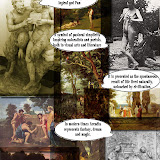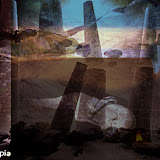The place: Utopia
2) Research
Utopia was made up out of necessity rather than joy (Visual Types of utopia)
Delving deeper into the makings of utopia, we can see that different cultures and civilizations visualised utopia in a different way. This has been manifested mainly through mythology. Religion, closely linked to mythology, has played a key role in determining this visual. Yet, one think that they have in common is reaching a perfect, happy and harmonious state of being. In some way utopias have long been the antidote of harsh and painful living, where human suffering & death is overcome. A flee from reality or “escape lands” is a characteristic of economic type of utopia.
Cultural and individual perceptions of utopia:
v Social can be divided into Western and Oriental.
Western is in quest for the ideal society and perfect (political) state, whereas the
Oriental culture has usually been is quest for the individual’s ultimate state of being. (I.e. Nirvana-religious driven)
v Individuals likewise have been accordingly affected in their perception of utopia. However since each individual is likely to describe or visualize utopia in a similar yet not same manner.
Types of Utopia
(Reference: Utopia. (2007, April 7). In Wikipedia, The Free Encyclopedia. Retrieved 16:12, April 7, 2007, from http://en.wikipedia.org/w/index.php?title=Utopia&oldid=120966795)
v Economic utopia.
According to utopian anarchism,” life is not static, so utopia refers not to a vague dream, a static environment in with "all are happy", but rather utopia is achieved as soon as this fluid system is achieved, recognizing that all goals change at all times, and progress is the source of satisfaction.” (Utopian anarchism. (2007, March 26). In Wikipedia, The Free Encyclopedia. Retrieved 19:46, April 7, 2007, from http://en.wikipedia.org/w/index.php?title=Utopian_anarchism&oldid=118064461)
Whereas in socialist utopia intellectuals who created hypothetical visions of perfect egalitarian and communalist societies without actually concerning themselves with the manner in which these societies could be created or sustained.
v Political & Historical utopia.
Here the Government establishes a society, striving towards perfection.
v Religious utopia.
In all Christianity, Jewish and Islamic religions one will meet the Heavens where purity and eternal happiness will finally reign, otherwise the sinners will end up in eternal punishment (dystopia). A characteristic example is the Garden of Eden describing in detail how utopia will be like. As mentioned above this is more of a social utopia rather than an individual.
Buddhism’s utopia is “Nirvana” this is the highest happiness achieved through enlightenment.
Hinduism is not far from Buddhism with “Moksha”, liberation from the circle of death.
v Scientific & Technological utopia
is maintained throughout the riches of technology, forming a radical change in human living standard. Such a utopia is mainly fictional and a great example could well be Star Trek.
Scientific Utopia: The Internet
Internet is the greatest invention after the car. Undoubtedly the way we interact has shifted. People form groups, communities of the same interests. Free applications and knowledge is global. I will not examine whether it has made us more or less communicative, but rather pinpoint the evolution of living standards. The direct access to information, e-commerce, long destination video calls, online meetings and what not!
Still you cannot see or hear the internet like you could experience any other place either on earth or mars. It is a place to meet, yet it resides nowhere. Nobody owns internet and it knows no country boundaries. Some claim it holds freedom of speech, others claim it is yet another government toy to entice and control its citizens all the more.
Like the knife, it is a tool made by humans and thus can be used for good and for bad; it is to the user’s intention whether internet is our utopia or dystopia. But nobody can reject the power or the medium! It is the milestone of our era or to the next era yet to come. Let’s enjoy it!




No comments:
Post a Comment